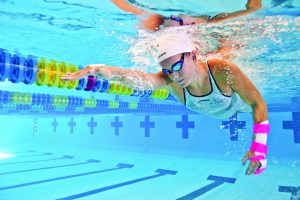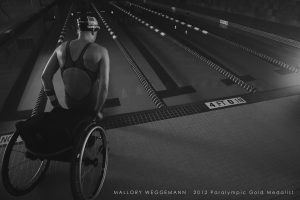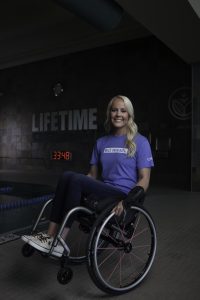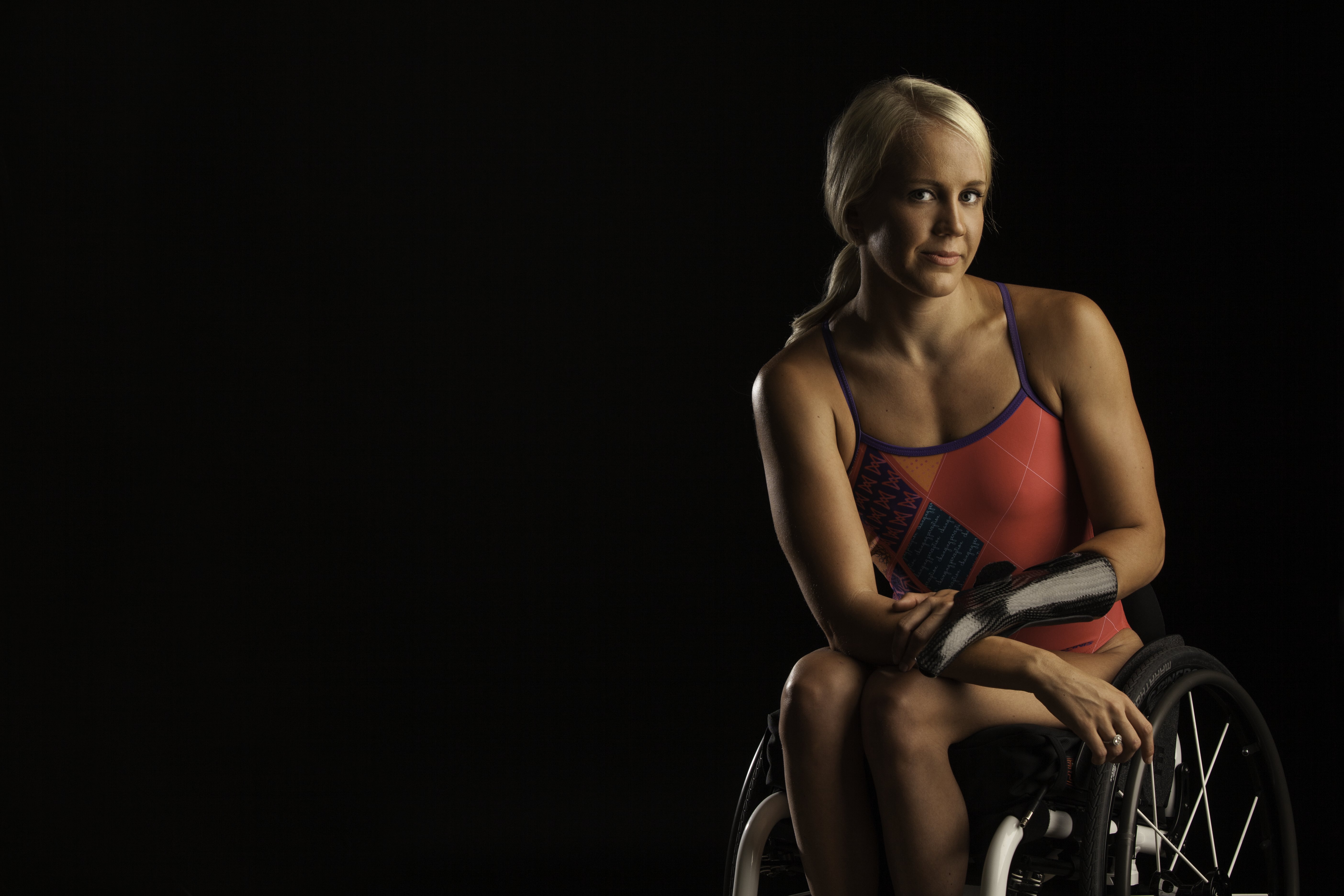When Mallory Weggemann became paralyzed due to a complication during an epidural injection in 2008, she didn’t know anybody with a physical disability. “I was a bit naïve of that world,” Weggemann admitted. “Then all of a sudden that was where I found myself after my injury.”
Weggemann had just graduated from high school the year before and attended classes at a local community college while living with her parents. After her paralysis, she said her family kept her from falling into the pattern of asking herself ‘what if?’ or ‘why me?’ They also helped Weggemann, who’d been a competitive swimmer since she was seven years old, get back in the water.
She transferred to the University of Minnesota and began training with her coach Jim Anderson. One year later, she’d take home five gold medals from the IPC Swimming Short Course World Championships in Rio de Jeinero and be named Female Disabled Swimmer of the Year by Swimming World two years in a row.
Today, Weggemann holds 34 American records and 15 world records.
Swimming is your main passion, especially during difficult times. How has swimming provided a safe haven for you?
P rior to my paralysis, swimming was as second nature as walking used to be for me. It was this comfort, kind of muscle memory—a place where I call home being in the water. I did water therapy during my time in the hospital.As much I tried to tell myself how much I loved the water, being in the water in that type of
rior to my paralysis, swimming was as second nature as walking used to be for me. It was this comfort, kind of muscle memory—a place where I call home being in the water. I did water therapy during my time in the hospital.As much I tried to tell myself how much I loved the water, being in the water in that type of
environment was really challenging for me. In a way, it turned the water into one of my biggest fears after my paralysis. When I was in the pool for therapy,
everything I knew about the water felt like it had changed, and I couldn’t feel my entire body—I didn’t have control of my body—and so it was really hard.
Eventually, I decided I didn’t want to do pool therapy anymore, I wanted to restore those years of happiness that the
pool brought me. When I ended up ultimately getting in the water for the first time in a swimming setting, I went into the pool incredibly eager and excited about the opportunity. I was at the University of Minnesota, they just had trials for the 2008 Paralympic games that weekend, and that’s how I got exposed to the side of disability swimming and the disability movement as a whole.
When I ended up returning to the pool on April 8,, 2008, I remember within four or five strokes of swimming over that black line, all of those fears that I once kind of went away. For the first time in those two and half months into my paralysis, I was able to leave my wheelchair behind and move my body forward on my own will without assistant equipment. It was just me having that independence.”
How did you stay motivated while you were pushing yourself through swimming and school?
We can be the strongest individuals in the world, but without the people around us, there is no way we can accomplish the things that we’re working to accomplish. In order to have strong community and have support, you also have to be that same person for those in your community as well. As far motivational standpoint, it’s 100 percent my community. It’s my husband, my parents, my sisters, my coach, my family, the strangers that I meet and it’s my friends. Without all of those individuals, I would not be remotely close to where I’m at today.
 When I got back into the water and throughout training, part of my motivation was to become as fast as I could become because that would fight back against the notion that I was physically incapable. When I first started breaking records, it became my way of fighting back. When I broke a record I wanted to make it faster, and then I wanted to go for another record. I felt as I got better as an athlete, the more I was fighting back against the stereotypes that I was physically incapable. That was my healing process after my injury. It took some time, and maybe for some, it seemed as if I was running away from it. But for me, it was my way of finding my purpose in life.
When I got back into the water and throughout training, part of my motivation was to become as fast as I could become because that would fight back against the notion that I was physically incapable. When I first started breaking records, it became my way of fighting back. When I broke a record I wanted to make it faster, and then I wanted to go for another record. I felt as I got better as an athlete, the more I was fighting back against the stereotypes that I was physically incapable. That was my healing process after my injury. It took some time, and maybe for some, it seemed as if I was running away from it. But for me, it was my way of finding my purpose in life.
What was it like to get in the pool and start beating the clock?
Now that I’ve advanced through my career, team USA in two Paralympic games and being a part of the Paralympic movement, a huge part of my motivation now is raising awareness. I’m still a fierce competitor as I prepare for the Tokyo Paralympic games. But I think for myself, at this point in my career, as much as being a competitor is ingrained in me, and as much it’s the fabric of who I am, I think another huge part of who I am and what I want to accomplish in the sport before I retire is wanting to leave the sport better than I found it. I want to be a role model for other athletes.
What goes through your mind when you’re out there competing and you hear the USA chants in the background at the Paralympics?
For me, it was so much different in Rio than in London in so many ways. I had a really severe arm injury in 2014 and lost some significant function and nervous system damage. Coming back from the injury as I looked to go back for my second time as a member of Team USA in the Paralympic games brought a lot of uncertainty. We weren’t really sure if I could even make it to Rio, and when I finally did make to Rio where I had won my first international medal at the 2009 International Paralympic Committee Swimming World Championships, it felt like my career was coming to full circle.
I had so much uncertainty in my life then and to go back there seven years later in 2016 as a member of Team USA for my second Paralympic games was really incredible for me. As a competitor, to go out into the pool deck, being in front of a stadium of sold out crowds, and feeling the energy in Brazil … They are incredibly enthusiastic.
As a competitor, I’ve always had that competitive drive within myself that has never wavered, but I think everything that I had to do to get to that point since the last time I was there made Rio much more emotional.
I know you had unforgettable experience in the Rio games, but talk to me about a favorite moment during your trip that you still remember today.
The final day of competition in Rio was September 17, and it was father’s birthday, and I was racing in the 200 IM. I was competing intion the finals that night and I was in lane two, which was the same lane that I was on in London of 2012 when I gold in the 50 meter freestyle. I had yet to medal in Rio going into my final race, and for me I felt that was my chance to finally be on the podium. I remember going on the pool deck and they announced us one by one, and I went out as they announced my name.
About 20 meters down the pool at the first row, nine people stood up as they announced my name. Those nine people where my family members and my coach, and I saw them going crazy with all of their USA gear on dressed in red, white and blue. I remember racing the race and I finished and hit the wall, and I did not feel like going off my block, and those lights are significant because the lights signify your place. One light is gold, the second light is silver, and third is bronze, while the others have no light. I looked up at the scoreboard and I saw sixth place next to my name, but I saw my career best time next to my name. I looked up into the stands, and the same nine people were standing, and my coach had his arms up in the air with tears rolling down his face. For me in that moment, I realize that there is no medal that would make this moment sweeter than it already was, even though and I came home from Rio without a medal.
In one of your speeches, you quoted your dad, saying, “You’re the best, you can make a difference and you can change the world.” Talk to me about the influence your dad had in your life.
 Those were my dad’s words that he shared with my sisters and me every day. As a kid, I really didn’t understand making a difference or changing the world. But after my injury, I had a chance to think about life.
Those were my dad’s words that he shared with my sisters and me every day. As a kid, I really didn’t understand making a difference or changing the world. But after my injury, I had a chance to think about life.
I realized that sometimes all we need to do and all we can ask for ourselves is to be at our best. As long as we are willing to be at our best, then we will make a difference and change the world through our everyday, simple actions. I think his words also served as a reminder to me in realizing that I was fortunate to have and still have two people in my life [my parents] that, no matter what happens on every given day, believe in their heart of hearts that I am the best, I can make a difference and I can change the world.
We get caught up in the rush of life, and we believe that we still have success by making it on our own. But it’s quite the opposite and I think we need to come back down to earth and remain humble in the fact that we are what we are is because of our community. That quote is a big part of me, and it’s tattooed on my ribcage. My dad still says it to me, and in return, it’s become a very big part in my speeches.
To have that kind of unwavering support makes all the difference in the world, and for me, those words are just that constant reminder. A reminder that we all have the ability to make a difference and to change the world, and the way we can do that is to be our best and give our best through that simple act of kindness, by showing grace and compassion rather than hate or judgment and by being willing to help out anyone in our society.

